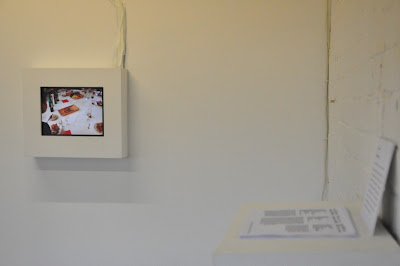Christian Cista, the part of video installation SITE SPECIFIC CINEMA: DIGBETH, AN AUTOBIOGRAPH, commissioned as part of 'Post - Industrial Revolution' curated by Kate Pennington-Wilson and Roma Piotrowska, 2011
Christian’s artistic practice is focused on identities connected to places and perception of the genius loci. For Post-Industrial Revolution he developed a site specific expanded cinema, which he describes as a medium capable of joining cinema, television, video, video art, documentary and fiction. Christian has created an installation in two parts, consisting of film and found imagery reflective of his time here in Digbeth. He carefully selected images, often with political connotations (such as CCTV cameras).
Christian Cista, the part of video installation SITE SPECIFIC CINEMA: DIGBETH, AN AUTOBIOGRAPH, commissioned as part of 'Post - Industrial Revolution' curated by Kate Pennington-Wilson and Roma Piotrowska, 2011
Christian Cista, the part of video installation SITE SPECIFIC CINEMA: DIGBETH, AN AUTOBIOGRAPH, commissioned as part of 'Post - Industrial Revolution' curated by Kate Pennington-Wilson and Roma Piotrowska, 2011
Christian Cista, a set of postcards for Birmingham, commissioned as part of 'Post - Industrial Revolution' curated by Kate Pennington-Wilson and Roma Piotrowska, 2011
Christian Cista, a set of postcards for Birmingham, commissioned as part of 'Post - Industrial Revolution' curated by Kate Pennington-Wilson and Roma Piotrowska, 2011
Artist also produced the set of photographs for Birmingham which hilights 'uniportant' sites of the city. He is interested in forgotten spaces such as the hidden river Rea, city graveyards (now utilized as parks), as well as derelict public houses of Digbeth. Showing this disused places brings them to attention again and rediscovers their forgotten haritage.
Chris also placed some books in the gallery by thinkers he is inpired by: Slavoj Zizek (First as tragedy, then as farce), Michel Foucault (Discipline and punish), Jacques Rancière (Hatred of Democracy) and by Giorgio Agamben. He created a cosy corner with a chair - as a place to read, to see the installation and to watch the film. Visitors are invited to read the books and to share their thoughts on the pages.
Christian Cista, the part of photographic installation THE GANG OF FOUR: MICHEL, GIORGIO, JACQUES, SLAVOJ, commissioned as part of 'Post - Industrial Revolution' curated by Kate Pennington-Wilson and Roma Piotrowska, 2011
Christian Cista, the part of photographic installation THE GANG OF FOUR: MICHEL, GIORGIO, JACQUES, SLAVOJ, commissioned as part of 'Post - Industrial Revolution' curated by Kate Pennington-Wilson and Roma Piotrowska, 2011
Christian Cista, the part of photographic installation THE GANG OF FOUR: MICHEL, GIORGIO, JACQUES, SLAVOJ, commissioned as part of 'Post - Industrial Revolution' curated by Kate Pennington-Wilson and Roma Piotrowska, 2011
Christian Cista, the part of photographic installation THE GANG OF FOUR: MICHEL, GIORGIO, JACQUES, SLAVOJ, commissioned as part of 'Post - Industrial Revolution' curated by Kate Pennington-Wilson and Roma Piotrowska, 2011















































